#Nebraska History
Explore tagged Tumblr posts
Text
Currently sitting here feeling very sad over what is possibly the most tragic love story I've ever heard.
For my volunteer job, I read for a couple different programs, one of which is called Bookshelf. Since we are located in Nebraska, the books on this program are by Nebraska authors and/or take place in Nebraska. Usually, I read fiction, but today I started a non-fiction book I've been planning to tackle for a while now. Evil Obsession by Nellie Snyder Yost.
The book mostly takes place on a farm that was located just outside the town I lived in during high school. It takes place starting in the late 1800s and tells the tale of Annie Cook, an extremely abusive, twisted, greedy woman.
Annie had a younger sister named Lizzie. When Lizzie was in her early twenties, her parents sent her to live with Annie. Annie was married to a farmer, Frank, and had a young daughter, Clara, (that she didn't love and did horrible things to).
When Lizzie moved in, she kept it secret that she'd met and was in communication with a man named Joe Knox. Joe lived in a town about 75 miles away, and had met Lizzie while she was still living with her parents in Denver. She and Joe wrote letters to each other, and he came for a very short visit right before Christmas. Fortunately, Annie, Frank, and Clara were away from the farm when Joe came by. When Joe learned just how much Annie abused Lizzie, he told Lizzie he'd be back in the spring so they could get married.
That spring, Lizzie escaped the farm on the day that Joe said he'd meet her at the courthouse in North Platte so they could get married. She did two of the miles on foot, but then a farmer stopped and offered her a ride.
Lizzie and Joe got married and he took her home to where his parents lived and ran a hotel. Not long after they got married, Annie showed up and tried to force Lizzie to leave Joe and come back to the farm. Lizzie refused, Annie got vicious, and Joe kicked Annie out threatening to get his gun if she didn't leave.
Annie only found out where Lizzie went because the farmer who gave Lizzie a ride was a neighbor and ended up telling Annie. Keep in mind that at the time almost no one knew how despicable Annie truly was. So, it's not a surprise that the farmer thought nothing of sharing that piece of information when Annie couldn't find Lizzie.
A couple years passed and Lizzie and Joe had a baby girl. The entire time, Annie had been plotting to try to get Lizzie back, but once the baby came Annie put her plotting on hold because she didn't like babies.
A few more years passed and Annie, deciding the baby was old enough to be of use, wrote and invited Lizzie and her little girl to come visit. Lizzie and Joe discussed it, and hoping Annie had really changed, Lizzie decided to go for the visit.
Annie had not changed. If anything, she was even worse than before.
As soon as Lizzie and her daughter were back in Annie's clutches, they couldn't escape. Joe came multiple times to try to get them back, even brought a lawyer at one point, but it was all futile. Annie had everyone else convinced she was a good woman, and knew that no one would be able to help Joe and Lizzie. The last time Joe came to try to get his family, Annie ran him off with a gun (details on this aren't very clear, but given other things Annie did, I have a theory that she may have shot him when forcing him to leave).
Lizzie's daughter escaped when she was old enough that Annie tried to force her to become a prostitute. (Side note: Annie ran a brothel and forced her own daughter to be one of the prostitutes.) Annie stabbed her and the girl ran away.
Lizzie never escaped, and was stuck with Annie until the day Annie died. After that Lizzie moved in with her now-adult daughter.
Joe never got Lizzie and their daughter back. They ended up divorced, due to abandonment.
I hope that when they died, Lizzie and Joe found each other and are now happy together, because they deserved a happily ever after and certainly didn't get it in this life.
#Nebraska History#Annie Cook#Evil Obsession: The Annie Cook Story#Nellie Snyder Yost#tragic love story
1 note
·
View note
Text

A Halloween Joke On Mr. Bryan
October 31, 1908
A pumpkin carved to resemble Roosevelt frightens Bryan. The startled Bryan drops the Lincoln Straw Vote.
The caption reads "William J.B. -- 'Oh, But That Gave Me A Start, But He's Not Running.'"
With the election days away, polls showed Bryan would likely lose his home state of Nebraska.
See Also: William Jennings Bryan; Theodore Roosevelt
From Hennepin County Library
Original available at: https://digitalcollections.hclib.org/digital/collection/Bart/id/6800/rec/2117
#charles bartholomew#political cartoon#1908 presidential election#theodore roosevelt#william jennings bryan#nebraska history#halloween
1 note
·
View note
Text
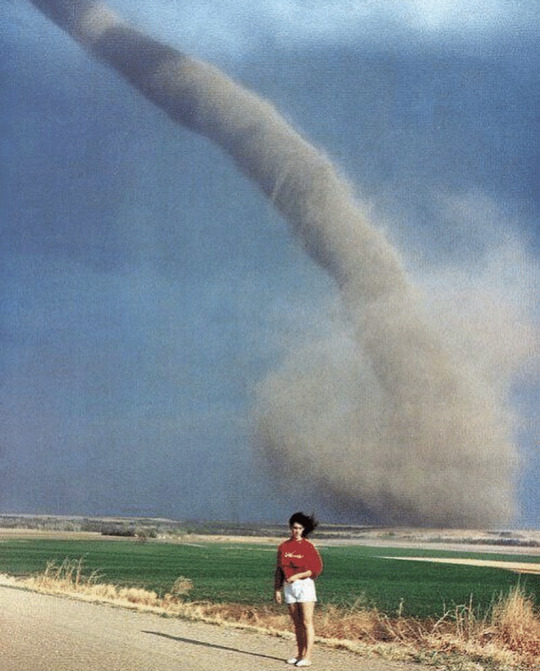
United States, 1989
A woman poses in front of a tornado (Nebraska)
-
4K notes
·
View notes
Text

omaha tornado cloud, nebraska, 1913
#i’m actually using this photo in my story i’m writing#tornado#tornado cloud#omaha tornado#nebraska#black and white#history#photography#not mine#powerlines#1913
197 notes
·
View notes
Video
Grinding around Breezy Point by Mike Danneman Via Flickr: Four Burlington Northern GE C30-7s pull hard on a PSCX coal train rounding Breezy Point west of Belmont, Nebraska, on the climb over Crawford Hill on July 7, 1996. In the background on the other side of the horseshoe curve is the end of the train and a helper set of three EMD SD40-2 and a fuel tender.
#bnsf#burlington northern santa fe#bn#burlington northern#1996#trains#freight train#history#belmont#nebraska
183 notes
·
View notes
Text
FROM THE LAST TOUR...
June 20, 1977
At the Pershing Municipal Auditorium, Lincoln, NE. Concert time: 8:30 pm. Crowd: 7500.


Elvis wore the Mexican Sundial suit with the Original belt.
45 notes
·
View notes
Text
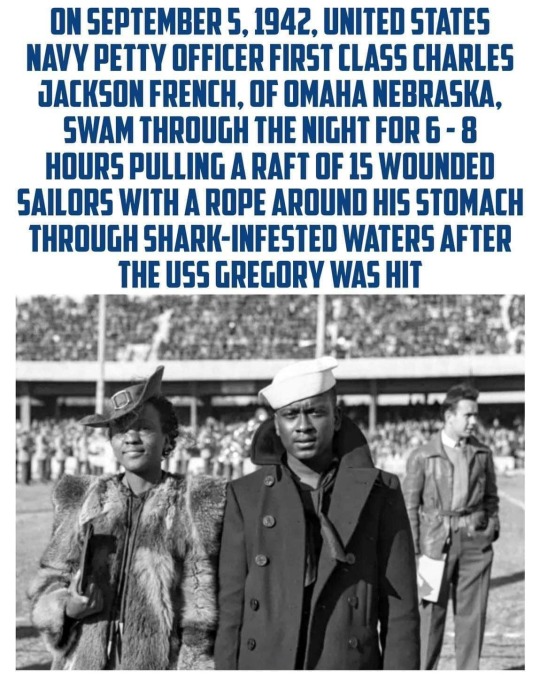
#1942#september5#omaha nebraska#united states navy#Charles Jackson French#hero#great courage#bravery#swamallnight6to8hours#15woundedsoldiers#pulledaraftofsoldiers#ocean#sharks#strongswimmer#blackhistory#black man#us naval history#USSGregoryhit#military history#military men#strongstomach
208 notes
·
View notes
Text
CONSPIRACY OF SILENCE [Banned Discovery Channel Documentary]
youtube
Before Epstein, there was Boys Town.
This documentary was pulled just before its broadcast date, in 1994. It was never aired.
#discovery channel#history#documentary#cover up#boystown Nebraska#human trafficking#child trafficking#catholic church#larry king#republican party#politics#child abuse#drugs#crime#FBI#omaha nebraska#propaganda#white house
117 notes
·
View notes
Text

Early morning on Platte River.
Nebraska
1985
#vintage camping#campfire light#platte river#nebraska#road trips#hiking#history#exploring#fishing#outdoors#travel
207 notes
·
View notes
Text
The Correct Birth Chart of Malcolm X: Scorpio Rising
In Honour of His Centenary
Based on my corrections to settings and calculations using online planetariums and my own star charts, which synchronise the constellations with the Nakshatras (28) and the Gregorian calendar - four years' work.
Part 2/?
Kristen Patterson / KP O'Neil
Jan. 15, 2025 / Uttara Ashadha P3 & P4 in Sagittarius / Social Capitalism & Prolific Writing
Recap from Part 1:
Malcolm's Sun / Gameplay instincts and triggers: Krittika Padas 1 & 2 in Taurus - Key-Holder & Diplomat
the stars of Subaru-The Pleiades-Seven Sisters-Mothers: territories, events and abilities of The Shining, life patterns from the story of Kartikeya / The Murugan and the Chakras;
Malcolm's Ascendant / Core Personality and life-drive: Jyeshtha Pada 3 in Scorpius - Ouranos Secrets in revolution, technology, astrology & stolen children -
the star Paikauhale (The Wanderer/Homeless) with his Ouranos at Lambda Piscium, the Red Room star (Twin Peaks - David Lynch is right) addressing the use of the term Black Lodge;
and edit: I wrote and published this the day before the announcement of David's death/transition - I wondered at his death being on the 16th, in Prolific Writing, when he was clearly the perfect Social Capitalist - and it turns out he transitioned on the 15th, when the energies shift between Social Capitalism to Prolific Writing - not the first time I've paused to be correct about the Pada of our deaths being the reason we die -
I'm moving forward with an eye for signs that Malcolm has been connected to David's work and Spirit Guides for some time - and I'm sending his chart to his children, to Bob Roth at the David Lynch Foundation, and to Tony Nader - hopefully one day these astrology corrections can be added to their/his toolkits;
Malcolm's Descendant / Core Personality as death-drive (thank you, Sabina Spielrein, for discovering it:) Rohini Pada 3 in Taurus - Business Guru
the star Hassaleh in Auriga (The Charioteer;)
Malcolm's Venus / Investments: Krittika Pada 3 in Taurus, conjunct with Betty's birthday, next to his Sun - Professional Muse
the stars of The Hyades again: territories, events and abilities of The Shining, life patterns from the story of Kartikeya / The Murugan and the Chakras;
Betty is his Muse, and he is everyone's... hmmmm... pause for heartbreak, thanksgiving...
With an AA Rodden rating for Malcolm's birth time, his Vertex and Anti-Vertex are seemingly fixed to the dates of Jul. 21-27 and Jan. 22-28: Padas 2 & 3 of Pushya in Cancer, and Padas 2 & 3 of Abhijit in Capricornus -
Praesepe/The Beehive/Home of Big Brother and The All-Seeing Eye,
and Okul/Occulus/The Eye of the Goat -
eyes on eyes -
(same Ascendant/Descendant as mine, and therefore same Vertex/Anti-Vertex - my experiences mixed with my research landed me at the decision about Lodge territory in the Beehive - but the Beehive originates with the Supreme God-Mother, Ala, and the Sibyls - is it truly Her territory, being smeared or overrun? Let's see if I can decide by the end of Malcolm's chart analysis... and given his devotion to Allah... does the name Ala pre-date the word Allah?)
I would, and I will - one day - take more time with these placements -
but speeding right along, I'll explain his Anti-Vertex as being near-fated decisions/actions he pretty much had no choice but to accept and enact, hitting those calendar dates more than once -
(and here's where he helps prove me right about re-inserting the displaced Nakshatra of Abhijit - and at full-size - when I found a gap in the Wheel by synchronising three ways of measuring it, back in 2021:)
I estimate Padas 2 & 3 of Abhijit, Jan. 22-28 (in Capricornus - not Aquarius - according to online planetariums, which is where I get my birth chart data,) to belong to Fated Winners/Heroes and Reverse-Engineers -
and I can detail what Malcolm was reverse-engineering by checking his chart circuits;
each of us have patterns (these circuits) set by our Ascendants, and they can be found in list-form and geometrically by lining up the 112 Padas (same if you stick with 108 Padas) so your Ascendant tops one column, next to Pada 1 of Ashwini in the other column - geometrically, by drawing lines across your chart wheel, starting with your Ascendant and Ashwini Pada 1 - I'll make diagrams of Malcolm's circuits and include them here:
(watch this space for images)
so - Malcolm's near-fated decisions and actions are as a Fated Winner/Hero - free will/wheel, at all? His sister Ella, in interview, stated they watched over his birth keenly, the seventh child, as a family rooted in ancestral understandings about the seventh child being born to do great things -
while his Vertex is interdependent with his Anti-Vertex: chicken-and-egg scenarios, as his decisions are relative to the near-fated decisions and actions of The Hive - namely the Caregiver-Medics and Collaborators in and around it...
people and Spirit Guides can be associated with this placement by calendar dates...
I guess I should check the reverse-engineering sooner than later...
...right - same circuits as mine, so only a few minutes to check:
Malcolm was/is reverse-engineering as a Jupiter Leader (my estimation of Pada 1 of Uttara Phalguni in Leo,) and an Interviewer (my estimation of Pada 1 of Mrigashira in Taurus;) with Jupiter Leadership generally amounting to our Wheel-Turning influence on the world - Jupiter being your primary function and House Lord (Creator of Houses, actually - as proven by a school/tradition of Chinese astrology;)
Malcolm's Jupiter, Wheel-Turning influence - if you're ready for it - in Pada 3 of Uttara Ashadha, in Sagittarius (here-and-now, as I type,) aligned with the modestly-named h1 & h2 Sagittarii, and Iota Sagittarii -
in what I call Social Capitalism - unfailingly sustainable (competant against militant threats,) profitable community economics -
his primary function, in all his houses - astrologically and geographically -
his concepts, Gurus, significant male relationships -
"You can't have capitalism without racism."
"Show me a capitalist, and I'll show you a bloodsucker."
(I'll come back with original sources for those quotes from him, but there he is - reverse-engineering capitalism as a social capitalist in interviews...)
think I'll mic-drop for now, and go make a cup of tea...
Oh - but I should include Malcolm's Juno with his Jupiter -
Juno pulling back the clouds to see what Jupiter is doing -
I connect Juno to dissociation, as illustrated by my delayed remembrance to include her in this post -
and in child-friendly terms, I connect Juno to the Fool's Journey in our charts - the Dorothy-and-Toto journey (and I'll choose The Wiz, much as I love Judy - and knowing how much David Lynch loves her...)
Malcolm's Juno being in Ophiuchus, lining up with the Moth Cluster and Baby Scorpion Cluster/Caldwell 76 in Jyeshtha Pada 4 of Neptune Secrets (Soul Contracts, murders, Muses - murdered Muses) - conjunct with his Core Personality/Ascendant,
with his Neptune below Leo's jaw - in Pada 4 of Ashlesha, conjunct with his Sevastopol asteroid - as in, Crimea/strategic position, heavily-fought-over - Pada 4, in my estimation, belonging to Anarchists, ruled by the star Algenubi/Ras Elased - (Southern Star of) the Head of the Lion -
Dorothy, Toto and the Lion... Ted Ross... will look for connections...
but I'd say we're right over the target: can't have sustainability without profit - just need the profit to be ethical -
Malcolm's dissociative-thinking, awakening-to-self...
does he have a strong placement influencing his Neptune Leadership in Pada 4 of Uttara Phalguni... I'll come back and say whether or not, when I exhaust my search...
but with Juno close-to-the-bone, so-to-speak, and Malcolm's Descendant as Business Guru - ahhhhh! That's his Descendant talking, when he calls down capitalism -
his Descendant dogged/Toto'd by his Juno, and how many Anarchical Muse/Neptune Spirit Guides reaching out to him through his Neptune -
with himself being poured out through his Venus investments as a Professional Muse to everyone in the world - no balance of profit for him in that role -
unless...
#malcolm x#betty shabazz#sidereal astrology#birth chart#astrology#scorpio#history#omaha nebraska#omaha#jyeshtha#rohini#krittika#murugan#pleiades#hyades#seven sisters#subaru#ouranos#red room#twin peaks#black lodge#david lynch#jupiter#venus#vertex#social capital#uttara ashadha#astro observations#astro notes#astro community
15 notes
·
View notes
Text

[Langston Hughes]
* * * *
LETTERS FROM AN AMERICAN
November 3, 2024
Heather Cox Richardson
Nov 03, 2024
I’m home tonight to stay for a bit, after being on the road for thirteen months and traveling through 32 states. I am beyond tired but profoundly grateful for the chance to meet so many wonderful people and for the welcome you have given me to your towns and your homes.
I know people are on edge, and there is maybe one last thing I can offer before this election. Every place I stopped, worried people asked me how I have maintained a sense of hope through the past fraught years. The answer—inevitably for me, I suppose—is in our history.
If you had been alive in 1853, you would have thought the elite enslavers had become America’s rulers. They were only a small minority of the U.S. population, but by controlling the Democratic Party, they had managed to take control of the Senate, the White House, and the Supreme Court. They used that power to stop the northerners who wanted the government to clear the rivers and harbors of snags, for example, or to fund public colleges for ordinary people, from getting any such legislation through Congress. But at least they could not use the government to spread their system of human enslavement across the country, because the much larger population in the North held control of the House of Representatives.
Then in 1854, with the help of Democratic president Franklin Pierce, elite enslavers pushed the Kansas-Nebraska Act through the House. That law overturned the Missouri Compromise that had kept Black enslavement out of the American West since 1820. Because the Constitution guarantees the protection of property—and enslaved Americans were considered property—the expansion of slavery into those territories would mean the new states there would become slave states. Their representatives would work together with those of the southern slave states to outvote the northern free labor advocates in Congress. Together, they would make enslavement national.
America would become a slaveholding nation.
Enslavers were quite clear that this was their goal.
South Carolina senator James Henry Hammond explicitly rejected “as ridiculously absurd, that much lauded but nowhere accredited dogma of Mr. Jefferson, that ‘all men are born equal.’” He explained to his Senate colleagues that the world was made up of two classes of people. The “Mudsills” were dull drudges whose work produced the food and products that made society function. On them rested the superior class of people, who took the capital the mudsills produced and used it to move the economy, and even civilization itself, forward. The world could not survive without the inferior mudsills, but the superior class had the right—and even the duty—to rule over them.
But that’s not how it played out.
As soon as it became clear that Congress would pass the Kansas-Nebraska Act, Representative Israel Washburn of Maine called a meeting of thirty congressmen in Washington, D.C., to figure out how they could fight back against the Slave Power that had commandeered the government to spread the South’s system of human enslavement. The men met in the rooms of Representative Edward Dickinson of Massachusetts—whose talented daughter Emily was already writing poems—and while they came to the meeting from all different political parties, often bitterly divided over specific policies, they left with one sole purpose: to stop the overthrow of American democracy.
The men scattered back to their homes across the North for the summer, sharing their conviction that a new party must rise to stand against the Slave Power. They found “anti-Nebraska” sentiment sweeping their towns; a young lawyer from Illinois later recalled how ordinary people came together: “[W]e rose each fighting, grasping whatever he could first reach—a scythe—a pitchfork—a chopping axe, or a butcher’s cleaver.” In the next set of midterm elections, those calling themselves “anti-Nebraska” candidates swept into both national and state office across the North, and by 1856, opponents of the Slave Power had become a new political party: the Republicans.
But the game wasn’t over. In 1857, the Supreme Court tried to take away Republicans’ power to stop the spread of slavery to the West by declaring in the infamous Dred Scott decision that Congress had no power to legislate in the territories. This made the Missouri Compromise that had kept enslavement out of the land above Missouri unconstitutional. The next day, Republican editor of the New York Tribune Horace Greeley wrote that the decision was “entitled to just so much moral weight as would be the judgment of a majority of those congregated in any Washington bar-room.”
By 1858 the party had a new rising star, the young lawyer from Illinois who had talked about everyone reaching for tools to combat the Kansas-Nebraska Act: Abraham Lincoln. Pro-slavery Democrats called the Republicans radicals for their determination to stop the expansion of slavery, but Lincoln countered that the Republicans were the country’s true conservatives, for they were the ones standing firm on the Declaration of Independence. The enslavers rejecting the Founders’ principles were the radicals.
The next year, Lincoln articulated an ideology for the party, defining it as the party of ordinary Americans defending the democratic idea that all men are created equal against those determined to overthrow democracy with their own oligarchy.
In 1860, at a time when voting was almost entirely limited to white men, voters put Abraham Lincoln into the White House. Furious, southern leaders took their states out of the Union and launched the Civil War.
By January 1863, Lincoln had signed the Emancipation Proclamation ending the American system of human enslavement in lands still controlled by the Confederacy. By November 1863 he had delivered the Gettysburg Address, firmly rooting the United States of America in the Declaration of Independence.
In that speech, Lincoln charged Americans to rededicate themselves to the unfinished work for which so many had given their lives. He urged them to “take increased devotion to that cause for which they gave the last full measure of devotion, that we here highly resolve that these dead shall not have died in vain, that this nation, under God, shall have a new birth of freedom, and that government of the people, by the people, for the people, shall not perish from the earth.”
In less than ten years the country went from a government dominated by a few fabulously wealthy men who rejected the idea that human beings are created equal and who believed they had the right to rule over the masses, to a defense of government of the people, by the people, for the people, and to leaders who called for a new birth of freedom. But Lincoln did not do any of this alone: always, he depended on the votes of ordinary people determined to have a say in the government under which they lived.
In the 1860s the work of those people established freedom and democracy as the bedrock of the United States of America, but the structure itself remained unfinished. In the 1890s and then again in the 1930s, Americans had to fight to preserve democracy against those who would destroy it for their own greed and power. Each time, thanks to ordinary Americans, democracy won.
Now it is our turn.
In our era the same struggle has resurfaced. A small group of leaders has rejected the idea that all people are created equal and seeks to destroy our democracy in order to install themselves into permanent power.
And just as our forebears did, Americans have reached for whatever tools we have at hand to build new coalitions across the nation to push back. After decades in which ordinary people had come to believe they had little political power, they have mobilized to defend American democracy and—with an electorate that now includes women and Black Americans and Brown Americans—have discovered they are strong.
On November 5 we will find out just how strong we are. We will each choose on which side of the historical ledger to record our names. On the one hand, we can stand with those throughout our history who maintained that some people were better than others and had the right to rule; on the other, we can list our names on the side of those from our past who defended democracy and, by doing so, guarantee that American democracy reaches into the future.
I have had hope in these dark days because I look around at the extraordinary movement that has built in this country over the past several years, and it looks to me like the revolution of the 1850s that gave America a new birth of freedom.
As always, the outcome is in our hands.
“Fellow-citizens,” Lincoln reminded his colleagues, “we cannot escape history. We…will be remembered in spite of ourselves.”
LETTERS FROM AN AMERICAN
HEATHER COX RICHARDSON
#Letters From An American#Heather Cox Richardson#Abraham Lincoln#history#American History#democracy#Civil War#political parties#slavery#mudsills#Declaration of Independence#US Constitution#Langston Hughes#Kansas-Nebraska Act#fellow citizens#us election 2024
9 notes
·
View notes
Text
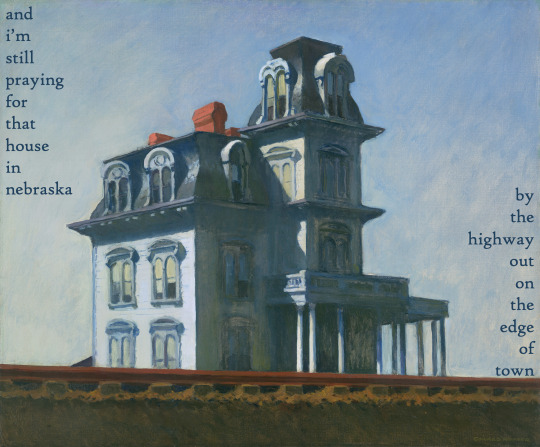
The House by the Railroad - Edward Hopper // Sun Bleached Flies - Ethel Cain
Hopper's The House by the Railroad as Ethel Cain's house in Nebraska - version four
#the house by the railroad#hopper#edward hopper#a house in nebraska#sun bleached flies#preacher's daughter#ethel cain#art#art history#lyrics#lyric art
163 notes
·
View notes
Photo
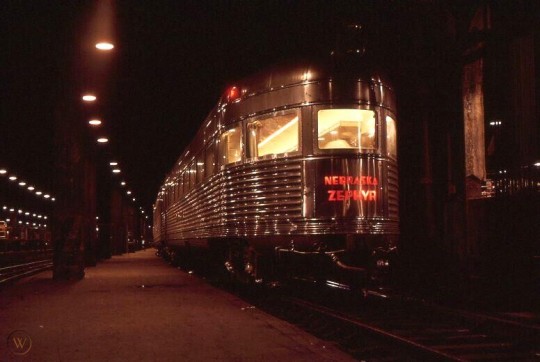
Nebraska Zephyr Observation Car at Union Station. Chicago, IL 1963
#nebraska zephyr#cb&q#burlington route#1963#chicago#lincoln#trains#passenger train#history#chicago union station#illinois#observation car
106 notes
·
View notes
Text

There Are Giants In These Days
October 17, 1908
The Minnesota Gopher looks up at the Giant Nebraska and Ames football players.
The caption reads "The gopher having passed the pumpkin-rollers is now comforted by the cornhuskers."
A week after having beaten the Iowa State football team in Minneapolis, the Golden Gophers were faced the following week by the tough University of Nebraska Cornhuskers, who at that time had beaten their previous three opponents by a combined score of 83-5.
From Hennepin County Library
Original available at: https://digitalcollections.hclib.org/digital/collection/Bart/id/6769/rec/2103
#charles bartholomew#political cartoon#college football#american history#minnesota gophers#nebraska cornhuskers#iowa cyclones
4 notes
·
View notes
Text




Samuel Colt obtained his first contract for the sale of revolver pistols to the United States government on January 6, 1847.
#Sam Macchette Station#Pony Express#architecture#log cabin#Nebraska#Gothenburg#Samuel Colt#first contract#revolver pistol#6 January 1847#anniversary#US history#Community Veterans Memorial#Munster#Indiana#summer 2019#original photography#travel#vacation#free admission#cityscape#public art#Julie Rotblatt-Amrany#Vietnam War#USA#tourist attraction#landmark
3 notes
·
View notes
Text
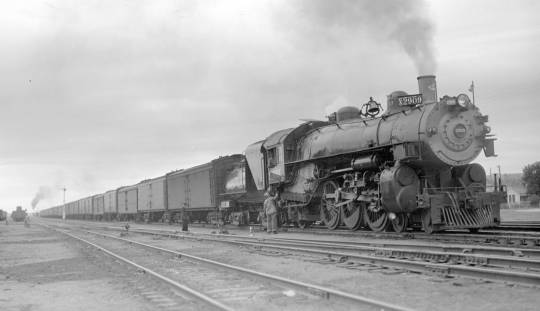
UP train, engine number 2909, engine type 4-6-2 Express train (cherries); 29 cars. Photographed: at Sidney, Nebr., May 31, 1937.
75 notes
·
View notes